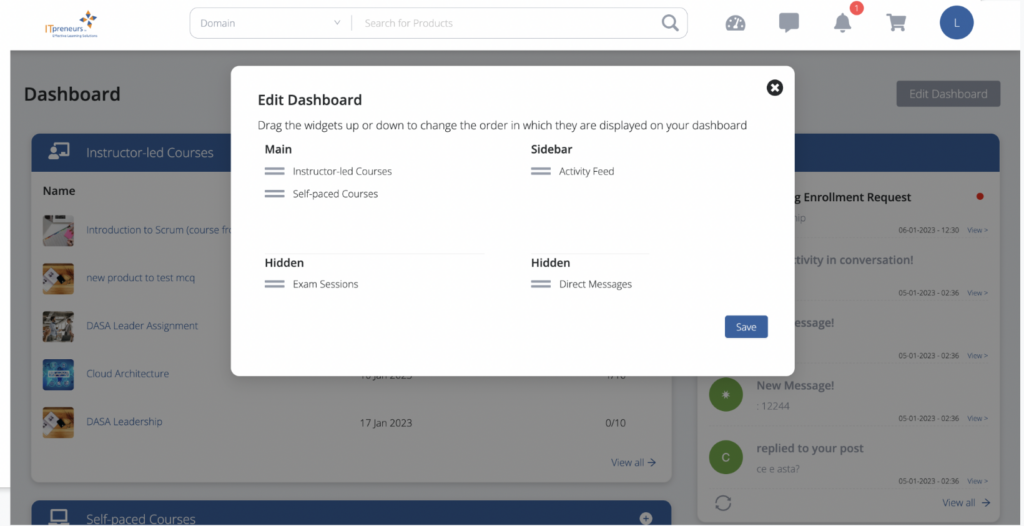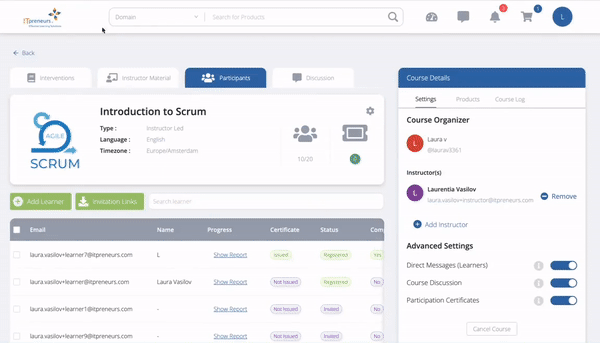In one of the previous posts in the ITpreneurs blog, my colleague Arjan Woertman asked a very relevant question: As a training provider, where do you want to be…?
More than four centuries before Arjan asked that question, Prince Hamlet asked an even more fundamental one. To be or not to be….
. In that scene, Hamlet, or Shakespeare to be more precise, laments the struggles and unfairness of life but also expresses his doubts as to whether death would be a solution or would simply make things worse.
To Be or Not to Be (a Training Provider)… That is the Question
Apart from loving Shakespeare (as it often happens to me with things I don’t fully understand), I do admire the relevance of many of his sayings even in the modern days. Therefore, before answering where do you want to be as a training provider, have you really answered the question if you really want to be (or keep being) one? Is the training industry a good place for you (or for anyone in that matter) to be in?
I can imagine that for some of you reading this post and being in the training industry in any way, as training companies, freelance instructors or consultants, training is far more than a business; its a passion, it is life itself. Since you were young you could imagine yourselves teaching, spreading your knowledge and experiences and feeling fulfilled by ‘awakening the natural curiosity of young minds with the purpose of satisfying it afterwards’ (Anatole France). Others have simply entered the training industry with more technocratic motives such as skills, background, industry attractiveness etc. Being a member of this exciting (but always changing) world of training, everyone is constantly thinking about how to improve, how to provide better services, how to improve efficiency or how to simply acquire bigger market share. This is all good and necessary, but how often are we thinking ‘is the training industry the right place for me’?
There are many theories on strategy and strategic thinking that have helped answer this, almost philosophical, question. The purpose of this post is not to answer it of course, neither to provide a simple way of tackling it. But in some cases, (as in the case of Hamlet), just by acknowledging the existence and importance of the question and being able to frame it, you have already made a huge and brave step ahead.
Porter Me This, Porter Me That
A tool that I have found very useful when trying to assess an industry in a quick way is Porter’s five forces theory. What this theory says is that there are basically five forces that shape the competitiveness and the attractiveness of an industry. So, as an IT training provider, this analysis will help you exploit the weaknesses in the industry to your advantage.
-
Threats of new entrants
How easily can a new player join the industry? In our context, how difficult is it for someone to start his/her own new company? How difficult is it to become a trainer? Are there any barriers to entry, like large investments, economies of scale or customer loyalty to existing brands? I would say no. Of course it highly depends on the frameworks we are looking at, therefore the threat of new entry of a new training company providing only ITIL Foundation courses is very high but a threat of a new entry of a company providing advanced Lean and Agile Project Management in 6 languages is quite lower.
-
Threat of substitutes
Are there other products that learners can buy instead of yours in order to fulfill the same (or similar) need? I would say no, for the time being, and this is probably the biggest advantage of the industry. Of course a substitute for a traditional course is and will always be self-study. But what about the future? Are there other forms of learning coming up that could potentially substitute the current traditional offerings within the training industry?
-
Bargaining power of customers
How price sensitive are your customers? How many alternatives do they have? I would say that on average, their power is quite high.
-
Bargaining power of suppliers
Here things are quite straight forward. The more the suppliers, the less power they have. Trainers, exam providers, material providers, Training venue landlords, consultants are all potential suppliers. How much power do you think these suppliers have? Of course, it depends again on the products you are specializing in but in general, I would say the bargaining power is average to low.
-
Rivalry intensity
How much competitiveness exists inside the industry? I believe that we could all agree that the rivalry is quite high.
Manipulate These Five Forces to Your Own Advantage
But have we answered the question? Is the training industry a good place to be in? Well, the answer is that on average, it does not look like a paradise. Based on the brief analysis made above, the training industry seems like a quite competitive industry with a lot of rivalries, customers who can bargain, new players who can enter easily and a future full of potential substitutes, especially as technology is boosting and revealing new ways to deliver goods and services every day.
The training industry is, therefore, no paradise but probably you know that already. What it is, however, is full of opportunities. The secret, in my and Porter’s opinion, is to try to manipulate these five forces to your own advantage. How, for example, can you reduce the customer power? A loyalty program perhaps? A high-quality product that they can not find anywhere else? Product and portfolio diversity? Or translating that in the training world, free exam retakes, free eLearning licenses whenever they attend certain courses? Career path advice mapped with their training needs and plans for the future? Training on emerging technologies or on frontier programs, and specialty products instead of mainstream courses?
Regarding the new entrants, what can you do in order to not be influenced by new entrants in the industry? The answer here is to make it difficult (or impossible) for a new entrant to be a real threat to you. For example, if you are an ITIL Foundation Trainer, the threat of a new entrant is as high as it can possibly be. The same as if you are a training company offering one single course on let’s say, the principles of project management. In order to make it hard or impossible for someone to take your place, you need to differentiate and do things that are not easy and take effort, investment etc. How can you leverage your suppliers? Do they have services you can take advantage of so you can focus on your core competencies? Ready-to-use content? Train-the-Trainer services? Marketing and sales support? What about substitutes? Here you need to simply do the hardest thing in life: change. Listen, be informed and follow the trends in technology. Look around you, the way people learn, the way they look for alternative methods and the ways these methods are perceived.
This list can never end and the best answers can only be given by you. Porter has given us the tool, it is up to all of us in the training industry to think and think again: Is the ship moving towards to right direction? What small or big adjustments do we need to make as captains of this ship? Do we belong in this ship in the first place? To be, or not to be….that is the question.
About the author

Passionate, pragmatic and enthusiastic customer operations leader with a focus on:
Boosting customer satisfaction in complex tech environments
Enabling and fostering scale through operations growth strategies and organisational scale
Leading customer-facing operational teams to success
Technology B2B business development and customer engagement
Development and implementation of systems and procedures
Logistics Management
Recruitment
Driving KPIs across quality, inventory, and costs to optimize growth and margin
Building and continuously improving robust operational processes to support the organizational customer strategy
Executive MBA degree holder with a background in operations and Industrial Engineering.



